The sentence in the heading is often recalled and reshared by many Sudanese people who had to, and still are, enduring war, suffering, and displacement after the breakout of conflict between two armed forces, the Rapid Support Forces of Lt. Gen. Mohammed Hamdan Daglo (also known as Hemedti), and the Sudanese Army under the leadership of gen. Abdel Fatah Al Burhan in Khartoum on April 15th, 2023.
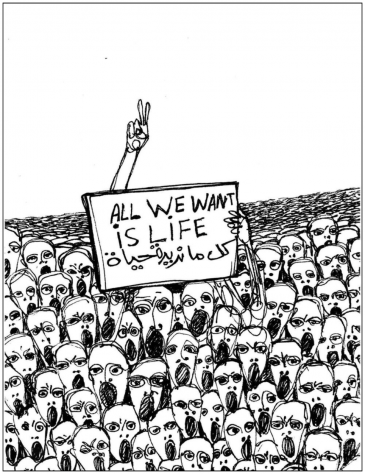
Galal Yousif
A war that is a battle for power between two rival armed forces has forced many to leave or lose their homes, jobs, and even worse, loved ones.
Before the fighting erupted, INSPIRE researchers Katarzyna (Kasia) Grabska and Azza Ahmed A. Aziz in partnership with Reem Aljeally from The Muse multi studios, in Khartoum, Sudan, organised a five day workshop with artists in Khartoum.
Open Space Khartoum opened on the 13th of April 2023 and was the result of over two years of ethnographic research (INSPIRE) with artists in the city. Collectively designed and organised, 15 artists, including visual artists, musicians, photographers and filmmakers, together with the two researchers worked with questions of what inspires their work and what their central themes of creative practice and their interconnectedness with the political and social context of Sudan are.
On the 15th of April, Azza and Kasia were getting ready to leave for the third day of Open Space Khartoum (Open Space). At around 9am, they heard sporadic shootings which then transformed into regular gun fire, bombardments and shelling. From the frantic whatsapp and SMS exchanges, they quickly learned about the attacks at the Sports Centre in Khartoum between the Rapid Support Forces of Hemedti and the Sudanese Army. The two groups were also fighting to gain control over the airport. Azza and Kasia found themselves trapped in the middle of the fighting, between the Presidential Palace and the Military Headquarters. The third day of Open Space had to be put on hold, as they communicated with Reem. The group of artists quickly sent messages of fear, disdain, and support over the whatsapp group that they created in the preparation of Open Space.
It has now been over a month and a half since the conflict between the two generals erupted and changed the course of Sudanese people’s lives. As a result, over a thousand people have been killed, over a million and half people became displaced internally and across borders and more than half of the country’s population has been left in need of urgent humanitarian assistance. The civil war raging in Sudan lies on a continuum of violence to which the Sudanese state has subjected its citizens over the long term (Azza Abdel Ahmed Aziz 2023).
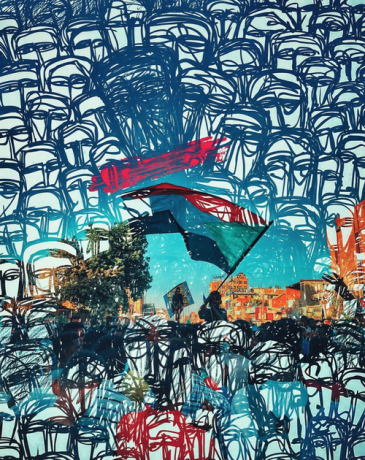
Galal Yousif. https://www.instagram.com/galalgoly/
“Today is a month since the war in Sudan started, it’s the war between 2 leaders, it’s a war for power and the people of Sudan have nothing to do with this war. So many got killed, so many are missing, so many crossed the borders of Sudan to find a safe place, so many were forced to leave their homes and everything behind like me, I left everything behind and my studio it’s in the fighting area these photos of my studio and full of paintings, especially my favourite pieces, I am not posting it to get it back but to show the world what people left behind and its war in the middle of the city Khartoum the capital of Sudan and there are 5 million people where they are not involved in the Sudan War” (Galal Yousif via Instagram, 15 May, 2023)
As a result of the escalating violence, many fear that the war will devastate the city’s burgeoning art scene that has emerged after the 2018 revolution in Khartoum, mainly driven by young artists who were beginning to gain national, regional and global attention after 30 years of a dormant cultural scene in Sudan. Some of the fiercest fighting in the capital has unfolded in neighbourhoods like Khartoum 2, where the city’s newest art galleries, including the Muse Gallery of Reem, are based, or bustling districts like Souk al-Arabi. Robberies and looting are rampant in those areas, carried out mostly by the paramilitary forces, gangs that have emerged as a result of chaos and fighting, as well as sporadically by poorer residents who enter houses that were left open.
Hundreds of Sudanese artists, curators and musicians have fled their studios and galleries in the capital, jeopardising thousands of artworks and bringing a pause to the emerging art scene. Among those mourning the loss of what we called life, are the artists and creatives of Sudan who were at the forefront of resistance since 2018. And just ironically, two days before this war erupted, when we launched INSPIRE Open Space in the heart of Khartoum, we started discussing how wars and conflict affect art and artists. We woke up on the 15th of April to a living war ourselves.
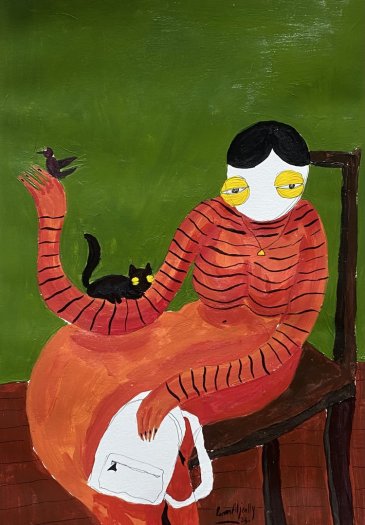
Reem Aljeally. https://www.instagram.com/reemaljeally/
As the fighting and displacement continued in Sudan, on the 16th of May, 2023, Azza, Kasia and Reem decided to follow up with these artists and asked over whatsapp whether their artistic and creative practice has helped them in the current situation of war and displacement. After making sure everyone and their families were safe, and upon reflecting within the workshop group, the creatives of Khartoum’s Open Space shared their deepest thoughts and expressions of the unsettling situation we found ourselves in, whether it be through a song, a text, an image, or even a fleeting thought. In this article, we share with you some of the responses from those artists who still have access to the internet and could share their thoughts with us.
Artist and painter Yasmeen Abdullah, who was nine months pregnant when this war started, had to leave for Shendi in Northern Sudan to be able to give birth safely after medical care was hardly possible in Khartoum. Yasmeen says:
“War is a very harsh experience, things change quickly and surprisingly, specifically for the artists who did not leave Sudan. I had to leave my studio, my tools, the reaps of years of artworks, and migrate to a safer city. Art in those times is more important than any previous period, as it documents the events and contributes to shedding light on the Sudanese crisis. As artists, we must have the ability to renew, start over, and search for new tools to express ourselves and the struggle we live in. We may not be able to translate these events directly, but they have certainly become part of our human and artistic being.”
While all the way from Eastern Sudan, from the city of Sinkat, musician and composer Hossam Abdalsalam shares this music piece in expression of love for his homeland. He played it in April on the outskirts of Port Sudan:
“I am Sudanese, everywhere in Sudan is a homeland of which we are proud and which we adore.
We sing of its beauty and without it we perceive none, if we desert it, we leave our hearts within it,
dwelling in its expanses.”
Organized by Kholal Gallery in Port Sudan, Hossam performed along with Mohamed Sonata – piano, Nassir Zack – guitar, Ibrahoma – oud, Amjed Qurashi – oud, and Nazar – bangaz. The concert was a way to bring the audience consolation from the experiences of the war. The musicians played traditional music and national songs, with the audience joining in singing.
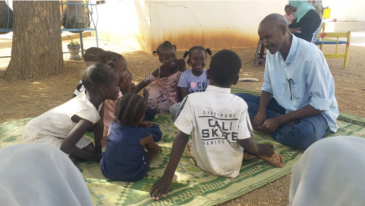
Abdelmagied Affifi: Working with displaced children in the city of Kosti. I am displaced too. https://www.instagram.com/abdelmageidafifi/
“Hope is the last thing that dies.” Mohamed Sonata, musician and music teacher who fled to Kassala and is now in Port-Sudan, Eastern Sudan as he tries to join his brother in the United Arab Emirates.
Artist and activist Abdelmagied Affifi who had to flee to the city of Kosti in White Nile state, gathers displaced children around him as he tells them stories, teaches them how to sculpt with local mud, and how to draw.
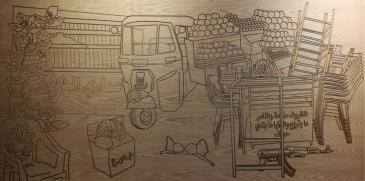
Artwork from Mozafar’s project at “Decaying Bank: Reproducing Khartoum Visually” at The Muse multi studios. Mozafar believes this artwork is a prediction or a visualisation of the current situation.
Mozafar Ramadan, a visual artist, designer, and author, shares his thoughts on the 17th of May, 2023, still being tapped in the capital.
“Indeed, for me in this situation, it’s very difficult to start making any painting or visual works. Maybe some sketches, instead of using materials that are difficult at the moment, the mood and the whole atmosphere is not helping either. So, I’m trying to write some of my notes about the events and my impressions towards it, to be a reference for my artwork, in painting or as literature, if I survive this war. I already started doing that and I see Khartoum city as a visual project since my contribution with The Muse multi studios’ residency project (Decaying Bank: Reproducing Khartoum Visually), so it’s a continual art project for me.”
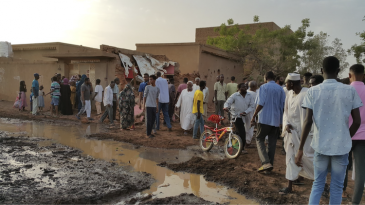
Photo by Mozafar Ramadan from his neighbourhood in Khartoum after an airstrike, May 2023. https://www.instagram.com/mozafarramadan/
Mozafar adds: “This position of war, makes the artist’s political attitude towards the work of art and towards his audience a moral necessity as a matter of social responsibility, because he stands in the first line of the civil front as a defender who uses a peaceful weapon and at the same time an honest documenter of the historical moment.”
A theatre professional, stage designer and a poet, Heibat Alfatih wrote this poem to reflect her creative process and in an attempt to spread hope and a call to hold on to the light at the end of the tunnel as she expresses.
Translated from arabic :
Among the destruction
Behind the wreckage
I hear a cheer
And roar for life
A hum for peace
The clapping of girls
A Zaghroura (a sound made by women in expression of joy) of hope
And the cooing of the pigeons
A Kambla dance (A traditional Sudanese dance from the West)
Songs and good news.. among the flames
Alaa Sherif now based in Kosti composed a song at the very beginning of the fighting and shared it on the whatsapp group: “Relentlessly we will fight”.
She said: “In this situation, the best they can do is take care of your and others’ mental health, play music, draw, sing, do whatever makes you feel alive and steal those moments of joy. All I am currently doing is that I gather my nieces and nephews and relatives and we sing together. I try to work on my new songs but I am not really in the mood of creation I guess. But I keep on singing for me and for my family.”
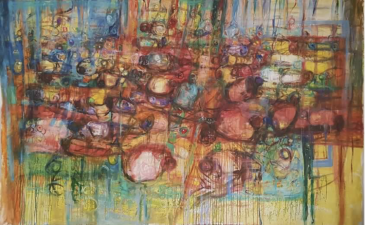
Artwork: The Massacre (1), Almogera Abdelbagi, 2019-2020-2022-2023, courtesy of the artist. https://www.instagram.com/almogera9096/
Visual artist and owner of Jaloos art space, Almogera Abdelbagi, has been a constant activist in the call for peace and coexistence. He has been on the frontlines of resistance in the 2018 revolution and is currently still in Khartoum in the city of Omdurman with his family. Almogera says:
“There is no constant but change in the universe. It is a situation or transformation for a better situation, as has been the case in the world. It must be rebellion, and then the revolution continues. The losses are painful, and that is what the war brings, but it must end. As long as the artists are safe and in good health, there is no doubt their production of art, drawing and style will change, the topics will diversify, and an artistic revolution will occur again. No to war!”
- This text was originally written in May 2023 and first published on the Inspire website. It remains salient as fighting that has upended Sudanese people’s lives continues to rage five months since the outbreak in April.
- Read more on the INSPIRE project’s research on Sudan here.
- Audio from the seminar Contemporary Arts and War in Sudan: Roundtable with Sudanese Artists.